We arrive in Philadelphia bleary-eyed after our night of partying in Brooklyn. The impaired capacity of my tired eyes isn't to blame for the unsightly outlook, though, Scott assured me. Philly is just plain ugly.
It’s a derelict city that looks like something out of the Great Depression, marred further by the addition of several truly hideous skyscrapers, and the destruction of its only cultural quarter.
“Philly is like a hobo wearing dirty sweatpants,” Scott says as we steer along Market Street, which used to be one of the world’s great centres of jazz.
It’s a derelict city that looks like something out of the Great Depression, marred further by the addition of several truly hideous skyscrapers, and the destruction of its only cultural quarter.
“Philly is like a hobo wearing dirty sweatpants,” Scott says as we steer along Market Street, which used to be one of the world’s great centres of jazz.
The long avenue was lined with clubs and theatres hosting the likes of John Coltrane and Dizzy Gillespie. However Market Street, and the black neighbourhood that fed it, was mowed to the ground by the city to make way for hulking university and corporate buildings.
“They cleared the area by declaring one in every few houses condemned, then acquiring the surrounding properties forcibly. It was an act of collusion between the city and the university.”
So why does Scott live here? Well, due to its deteriorated state, Philly is attracting a scene of artists and activists who are reshaping the city. They arrived with the Republican National Convention of 2000, an event that is always shadowed by a circus of demonstrations (this convention in particular deserved protest – it was where Bush and Cheney received their fateful party nominations). In the aftermath of the street protests, hundreds of activists found themselves stuck in Philly, required to appear in court. They occupied run-down row houses in West Philly, waiting for their court dates. Many simply stayed there.
Scott bought his row house for about $10,000. There are still houses on sale for that amount or less in the unloved cities of America – particularly Detroit, a city which is following the fortunes of its automobile companies (see this video to understand how much Detroit has deteriorated).
Scott only regrets not buying whole blocks of houses, disconnecting them from the power grid, closing the streets to car traffic and creating a green village for likeminded people, as some groups are doing in deteriorated cities.
West Philly is still rough, but lovable. Scott stands on his porch and holds conversations with passing locals. We drive around and inspect boarded-up old theatres and walls covered in paint-and-tile murals (they love their murals in Philly). There’s an Ethiopian restaurant on one corner (“one of the three top Ethiopian kitchens in the country,” Scott informs me authoratively), and a donut shop on the other, testifying to the ethnic diversity.
I leave Philly on the Chinatown bus, captained by a giant black driver who seems to know most of the passengers by name. I fall asleep as Philadelphia’s ugly skyline disappears from view, and awake to a glimpse of the gleaming white dome of the congress building. We have arrived in DC.
...Read more
“They cleared the area by declaring one in every few houses condemned, then acquiring the surrounding properties forcibly. It was an act of collusion between the city and the university.”
So why does Scott live here? Well, due to its deteriorated state, Philly is attracting a scene of artists and activists who are reshaping the city. They arrived with the Republican National Convention of 2000, an event that is always shadowed by a circus of demonstrations (this convention in particular deserved protest – it was where Bush and Cheney received their fateful party nominations). In the aftermath of the street protests, hundreds of activists found themselves stuck in Philly, required to appear in court. They occupied run-down row houses in West Philly, waiting for their court dates. Many simply stayed there.
Scott bought his row house for about $10,000. There are still houses on sale for that amount or less in the unloved cities of America – particularly Detroit, a city which is following the fortunes of its automobile companies (see this video to understand how much Detroit has deteriorated).
Scott only regrets not buying whole blocks of houses, disconnecting them from the power grid, closing the streets to car traffic and creating a green village for likeminded people, as some groups are doing in deteriorated cities.
West Philly is still rough, but lovable. Scott stands on his porch and holds conversations with passing locals. We drive around and inspect boarded-up old theatres and walls covered in paint-and-tile murals (they love their murals in Philly). There’s an Ethiopian restaurant on one corner (“one of the three top Ethiopian kitchens in the country,” Scott informs me authoratively), and a donut shop on the other, testifying to the ethnic diversity.
I leave Philly on the Chinatown bus, captained by a giant black driver who seems to know most of the passengers by name. I fall asleep as Philadelphia’s ugly skyline disappears from view, and awake to a glimpse of the gleaming white dome of the congress building. We have arrived in DC.
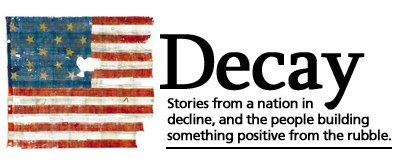
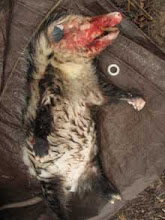
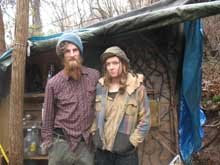
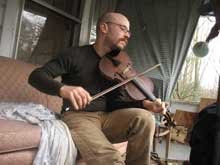

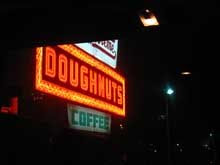
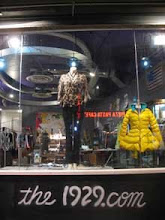

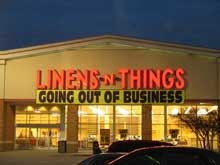
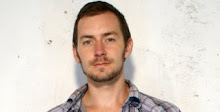
No comments:
Post a Comment